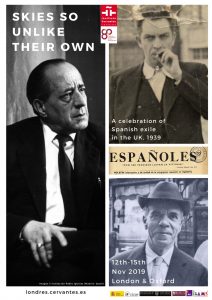Londres y Oxford celebran la memoria del exilio español en Reino Unido
Instituto Cervantes de Londres organiza un programa conmemorativo que rinde tributo al exilio republicano español con ocasión del 80 aniversario del fin de la Guerra Civil. El ciclo lleva por título “Cielos tan distintos a los suyos: una celebración del exilio español en el Reino Unido, 1939” (“Skies so unlike their own: a celebration of Spanish exile in the UK, 1939”) y propone conferencias, mesas redondas, presentaciones de libros, una proyección de cine y un concierto, en actos gratuitos y abiertos al público que tendrán lugar entre el 12 y el 15 de noviembre en Londres y Oxford. Uno de los actos más importantes del programa es el homenaje abierto a Manuel Chaves Nogales que tendrá lugar ante la tumba del escritor sevillano en el cementerio de North Sheen.
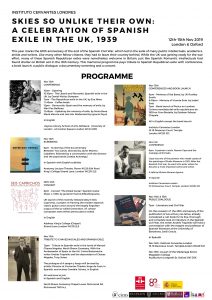
El exilio de numerosos intelectuales públicos, académicos, artistas y escritores españoles a Reino Unido tuvo lugar al tiempo que los propios británicos se preparaban para afrontar la Segunda Guerra Mundial. Con la acogida de importantes nombres como Luis Cernuda, Manuel Chaves Nogales o Arturo Barea, Reino Unido volvía a ser una capital de la inteligencia española, como ya lo había sido en el siglo XIX con el exilio de liberales y románticos.

Reintegrar la memoria de España
“Con este programa culminamos nuestro homenaje al exilio español’, afirma el director del Instituto Cervantes de Londres, Ignacio Peyró, ‘un homenaje que comenzó en 2018 con la cesión del archivo de Arturo Barea a la biblioteca Bodleiana de Oxford y continuó con la exposición dedicada a Manuel Chaves Nogales en Europe House en febrero de este año”. Para Peyró, “reivindicar el exilio es reintegrar la memoria de España, incluyendo en ella la de esos ‘españoles del éxodo y el llanto’ de los que habló León Felipe. Y homenajear al exilio también es un homenaje a ese país justo y democrático que es la España contemporánea, con el que soñaron tantos exiliados”.
El programa cuenta con el apoyo de la Comisión Interministerial para la Conmemoración del 80 Aniversario del exilio español y, junto al Instituto Cervantes, es un empeño conjunto de otras instituciones, como la Embajada de España, Magdalen College (Oxford), Birbeck – University of London, King’s College Modern Language Centre, CICUS (Universdidad de Sevilla) y The Iberian and Latin American Music Society.
Desarrollo
Las jornadas arrancan con unas conferencias el martes 12 de noviembre en Birkbeck – University of London, donde el el profesor titular de Literatura Española en Kings’ College (Londres), Daniel Muñoz Sempere, tratará el exilio español liberal y romántico en Reino Unido; mientras que la investigadora asociada de la Universidad de Cardiff, Eva Nieto, charlará sobre el exilio republicano. Por su parte, la lectora de Literatura Española Moderna y Estudios Culturales en Birkbeck – University of London, Mari Paz Balibrea, hablará sobre la España democrática y la memoria del exilio.
La mañana de conferencias concluirá con la mesa redonda “Actualizando la memoria del exilio”, con la participación de la artista Sonia Boue, la profesora María Mencía y la escritora Lala Isla. Moderada por el director del Instituto Cervantes de Londres, Ignacio Peyró, en esta mesa redonda se comentarán los proyectos de cada una de las participantes en favor de la memoria del exilio.
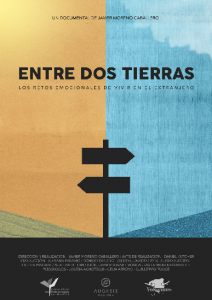
El mismo 12 de noviembre, a las 6 de la tarde en King’s College, tendrá lugar la proyección del documental Entre dos tierras, en español con subtítulos en inglés, dirigido por Javier Moreno Caballero, seguido de coloquio con el propio director y con el psiquiatra Joseba Achotegui.
Entre dos tierras habla de los retos emocionales de vivir en el extranjero, el fenómeno conocido por los expertos como “duelo migratorio”. A través de varios testimonios recientes de españoles se busca entender la complejidad de las vivencias a las que deben enfrentarse los inmigrantes durante su experiencia lejos del propio país.
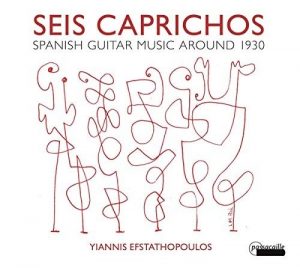
La jornada del martes 12 termina con el concierto La guitarra exiliada: Música española para guitarra en la década de 1930, a cargo del guitarrista Yiannis Efstathopoulos, en la capilla de King’s College, célebre monumento del neogótico.
Efstathopoulos presenta este concierto basado en su último trabajo discográfico, Seis Caprichos. Música española para guitarra en torno a 1930. Víctimas de la llamada Generación del 27 de la música, los compositores aquí presentados fueron perseguidos por Franco o tuvieron que marchar al exilio. Las obras que ha de tocar el intérprete griego, estudioso de la música del exilio, son piezas para guitarra compuestas en un momento fascinante, cuando el gran instrumento español todavía estaba buscando su lugar y formulando su identidad dentro la música culta en España y en el contexto internacional.
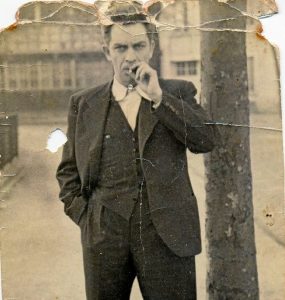
El miércoles 13, a las 12pm, habrá un homenaje al exilio español en la tumba de Manuel Chaves Nogales, en el cementerio de North Sheen. Contará con la presencia del embajador de España en el Reino Unido, Carlos Bastarreche, el escritor Andrés Trapiello y el nieto de Chaves Nogales, Tony Jones.
En el 75 aniversario de la muerte de Chaves Nogales, el homenaje previsto incluye la lectura del prólogo de A sangre y fuego, en español y en inglés, a cargo del director artístico del Cervantes Theatre, Jorge de Juan, y la actriz Candela Gómez, así como un texto de Trapiello escrito para la ocasión.
Olvidado durante décadas, el escritor y periodista sevillano Chaves Nogales (1897-1944) es hoy considerado una de las voces más lúcidas y honestas de la literatura española en el siglo XX, ante todo por la independencia y valor testimonial de libros como A sangre y fuego, sobre la Guerra Civil española. Muerto en duras circunstancias en su exilio en Londres, Chaves Nogales fue enterrado en una tumba sin lápida en el cementerio de North Sheen.
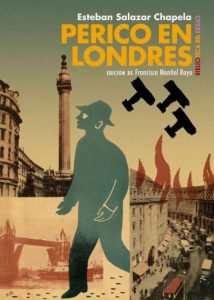
Como tramo final del día, el mismo miércoles 13, a las 6pm, en la biblioteca del Instituto Cervantes de Londres, se buscará recuperar la memoria de Ilsa Barea –traductora de la obra de Arturo Barea- con una charla a cargo de su sobrina, Uli Rushby-Smith. También se quiere dar continuidad a las distintas reivindicaciones de la memoria del escritor Vicente Soto, para lo cual Isabel Soto, profesora universitaria de literatura e hija del intelectual exiliado, hablará del autor y leerá fragmentos traducidos de su obra. Por último, se presentará la reedición del libro Perico en Londres: Crónica novelada del exilio republicano de 1939 en Gran Bretaña, de Esteban Salazar Chapela. En el acto está prevista la intervención del catedrático de Historia del Arte de la Universidad de Sevilla Luis Méndez; de la editoria literaria del libro, Francisca Montiel, y de Christina Linares, de la Editorial Renacimiento.

Al día siguiente, jueves 14, a las 6pm, en la biblioteca del Instituto Cervantes de Londres, tendrá lugar la conferencia “Un pintor en el exilio. Ramón Gaya y la nostalgia de El Prado”, a cargo de Miriam Moreno Aguirre, experta en el artista murciano, sobre el que ha publicado una tesis doctoral y una monografía.
Gaya, fundador de la revista Hora de España, fue uno de los pintores que realizó las copias de los cuadros del Museo del Prado en 1932. Desde entonces las expuso, junto con Antonio Sánchez Barbudo, en el Museo circulante de las Misiones Pedagógicas de la República, hasta el comienzo de la Guerra Civil. Gaya, pintor de honda influencia y genial ensayista, definió al Museo del Prado como “una especie de Patria” y tomó lección de sus obras para impulsar una figuración compatible con la modernidad pictórica.
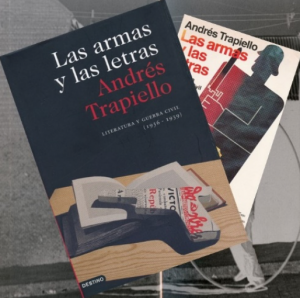
Por último, a las 7pm, habrá una conversación pública entre el escritor Andrés Trapiello y el ensayista y catedrático Jordi Gracia, en celebración del 25 aniversario de la publicación de Las armas y las letras, un volumen de Trapiello considerado ya un libro de culto por su mirada libre, minuciosa y completa sobre la literatura en la Guerra Civil española.
El viernes 15, a las 7pm, Trapiello y Gracia mantendrán una charla de similares características en el auditorio de Magdalen College en Oxford, dentro de las Madariaga Series con las que, bajo la dirección del catedrático Juan Carlos Conde, colabora el Instituto Cervantes.
Tamara Rojo highlights the contribution of Spanish immigration to London
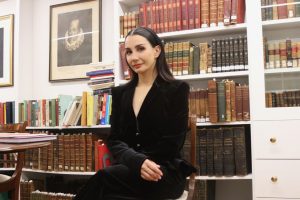
Dancer and director of the English National Ballet, Tamara Rojo, highlighted the contribution of Spanish immigration to London during her participation in a meeting of the new series of White-White Dialogues, in a conversation with the director of the Cervantes Institute in London, Ignacio Peyró.
The prestigious dancer reviewed her extraordinary artistic career and talked about the world of dance, her sacrifices and her successes, as well as the career of a Spanish woman who has triumphed in the British world.
Rojo came to London 22 years ago and remembers that everything was closed on Sundays and at six in the afternoon. But he acknowledges that he has now become a much more cosmopolitan city and part of that has been due to the contribution of Spanish immigration.
“Obviously, for me that is a pleasure. Above all, in gastronomy, because it must be recognised that British gastronomy, 20 years ago, did not have a high quality. The influence that there are so many Spanish restaurants here, so many business circles of Spanish people, artists and people that I can deal with, I think is something very positive,” she added.
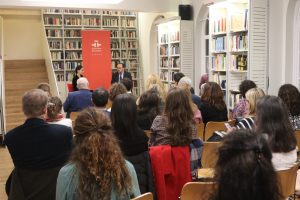
London: cultural capital of the world
For Rojo, London right now is the cultural capital of the world, because it contains a little bit of everything. “That is one of the main reasons why I love living here. As an artist, I love meeting artists and works of all kinds. It is a constant source of inspiration. The only stressful thing about London is that there is not enough time in the year to see everything there is,” explained Rojo.
The dancer recognises that her dreams have evolved. When she arrived here she wanted to be a dancer, then a prima ballerina and finally to perform and work for the The Royal Ballet. Right now, she has been artistic director for the English National Ballet for seven years, and she believes that this year is the completion of her original vision she envisaged when she first took the role. Namely, Rojo has moved the National Ballet to new facilities, being invited by theatres such as the Bolshoi in Moscow or the Paris Opera, with an international reputation, and with the works they have created.
New challenges
“Let’s say that, finally, the company is now what I thought it could be. Obviously, up to a point, now the best comes, the icing. I still have many things to do,” she says. Among those challenges is to reinterpret the classics, not only in a contemporary way, but also with a classical vocabulary, to make the company financially more and more independent and secure: “It’s nothing totally new, but an expansion of our vision, which I feel that only now we have achieved”.
The White-White Dialogues bring great characters related to Spanish culture and relations between Britain and Spain to the British public. In a relaxed and relaxed atmosphere, prone to confidences, Rojo opened this new format with an in-depth conversation, open to the public, in the library of the Cervantes Institute in London.
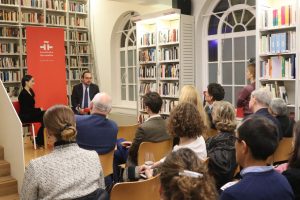
“We are in a very complicated moment with Brexit. Not only for me personally or for in English National Ballet, but also for all creative industries,” defended the dancer. In the first place, she believes that this will be the case for the creative industries, since both London and the United Kingdom feed on the freedom of movement of individuals and also of materials.
“Many British musicians survive thanks to coming and going to Europe. Also co-productions, festivals, touring Europe without paying different taxes for sets and costumes. The expense, the time, the visas… For us it will be bad, but for companies of less resources and individual artists it can be lethal”, Rojo recognizes.
Relevance of the White-White Dialogues
Peyró highlighted the relevance of these dialogues to deepen the ties that unite both countries, in a cycle that in the coming months will also feature the presence of the writer and Cervantes 2016 award winner Eduardo Mendoza, chef Jose Pizarro and the journalist, writer and businessman Juan Luis Cebrián, among others.
«We want to offer, above all to our Spanish students, access to relevant personalities and with great experience, which, in this environment of confidence, can bring them closer to culture and language,» Peyró said.
Tamara Rojo destaca el aporte de la inmigración española a Londres

La bailarina y directora del English National Ballet, Tamara Rojo, destacó el aporte de la inmigración española a Londres durante su participación en un encuentro de la nueva serie de Diálogos Blanco-White, en una conversación con el director del Instituto Cervantes de Londres, Ignacio Peyró.
La prestigiosa bailarina repasó su extraordinaria trayectoria artística y habló del mundo de la danza, de sus sacrificios y sus éxitos, y de la carrera de una española que ha triunfado en el mundo británico.
Rojo vino a Londres hace ya 22 años y se acuerda de que todo estaba cerrado los domingos y a las seis de la tarde. Pero reconoce que ahora se ha convertido en una ciudad mucho más cosmopolita y parte de eso ha sido por el aporte de la inmigración española.
“Obviamente, para mí eso es un gusto. Sobre todo, en la gastronomía, porque hay que reconocer que la gastronomía británica, hace 20 años, no tenía una gran calidad. La influencia de que haya tantos restaurantes españoles aquí, tantos círculos de negocios de personas españolas, de artistas y gente con la que me puedo tratar, creo que es algo muy positivo”, añadió.

Londres, capital cultural del mundo
Para Rojo, Londres ahora mismo es la capital cultural del mundo, porque en ella puedes encontrarlo todo. “Esa es una de las razones principales por las que me encanta vivir aquí. Como artista, me encanta conocer a artistas y obras de todo tipo. Es una fuente constante de inspiración. Lo único estresante de Londres es que no hay suficiente tiempo en el año para ver todo lo que hay”, explicó Rojo.
La bailarina reconoce que sus sueños han ido evolucionando. Cuando llegó aquí quería ser bailarina, después primera bailarina, después ir al Royal Ballet. Ahora mismo, lleva siete años como directora artística, y cree que este año es, en el que ha llegado a la visión que ella tenía cuando tomó la compañía. Es decir, mudarse a las nuevas instalaciones, ser invitados por teatros como el Bolshoi de Moscú o la Ópera de París, con una reputación internacional, y con las obras que han creado.
Nuevos retos
“Digamos que, finalmente, la compañía es ahora la que yo pensaba que podía ser. Obviamente, hasta cierto punto, ahora llega lo mejor, la guinda, todavía me quedan muchas cosas por hacer”, subrayó. Entre esos retos se encuentra reinterpretar los clásicos no solo de forma contemporánea, pero también con un vocabulario clásico, hacer que la compañía sea financieramente cada vez más independiente y segura: “No es nada totalmente nuevo, pero una expansión de nuestra visión, que siento que solo ahora hemos llegado”.
Los Diálogos Blanco-White acercan al público británico a grandes personajes relacionados con la cultura española y las relaciones entre Gran Bretaña y España. En un ambiente distendido y relajado, propenso a las confidencias, Rojo estrenó este nuevo formato con una conversación en profundidad, abierta al público, en la biblioteca del Instituto Cervantes de Londres.

“Estamos un momento bastante complicado con el Brexit. No solo para mí personalmente o para en English National Ballet, sino también para todas las industrias creativas”, defendió la bailarina. En primer lugar, cree que así lo será para las industrias creativas, pues tanto Londres como el Reino Unido se alimentan de la libertad de movimientos de individuos y también de materias.
“Muchísimos músicos británicos sobreviven gracias a ir y venir a Europa un día, también coproducciones, festivales, giras por Europa sin tener que pagar diferentes impuestos por sets y los trajes. El gasto, el tiempo, los visados… Para nosotros va a ser malo, pero para compañías de menos recursos y artistas individuales puede ser letal”, reconoce.
Relevancia de los Diálogos Blanco-White
Peyró destacó la relevancia de estos diálogos para ahondar en los lazos que unen a ambos países, en un ciclo que en los próximos meses también contará con la presencia del escritor y premio Cervantes 2016 Eduardo Mendoza, el chef Jose Pizarro y el periodista, escritor y empresario Juan Luis Cebrián, entre otros.
“Queremos ofrecer, sobre todo a nuestros alumnos de español, el acceso a personalidades relevantes y con gran trayectoria, que, en este ambiente de confidencia, les puedan acercar a la cultura y el idioma”, señaló Peyró.
Tamara Rojo lanza los nuevos Diálogos Blanco-White en el Instituto Cervantes de Londres
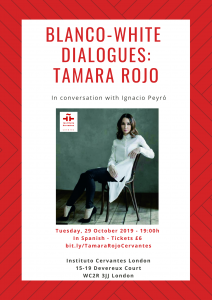
La nueva serie de Diálogos Blanco-White contará con una invitada de excepción, la bailarina y directora del English National Ballet, Tamara Rojo, el próximo martes 29 de octubre a las 19:00 horas, en una conversación con el director del Instituto Cervantes de Londres, Ignacio Peyró.
La prestigiosa bailarina repasará su extraordinaria trayectoria artística y hablará del mundo de la danza, de sus sacrificios y sus éxitos, y de la carrera de una española que ha triunfado en el mundo británico.
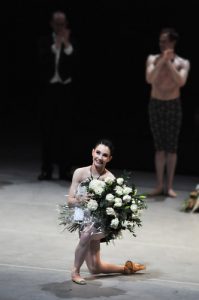
Los Diálogos Blanco-White acercan al público británico a grandes personajes relacionados con la cultura española y las relaciones entre Gran Bretaña y España. En un ambiente distendido y relajado, propenso a las confidencias, Rojo, estrena este nuevo formato con una conversación en profundidad, abierta al público.
Peyró destaca la relevancia de estos diálogos para ahondar en los lazos que unen a ambos países, en un ciclo que en los próximos meses también contará con la presencia del escritor y premio Cervantes 2016 Eduardo Mendoza, el chef Jose Pizarro y el periodista, escritor y empresario Juan Luis Cebrián, entre otros.
“Queremos ofrecer, sobre todo a nuestros alumnos de español, el acceso a personalidades relevantes y con gran trayectoria, que, en este ambiente de confidencia, les puedan acercar a la cultura y el idioma”, señala Peyró.
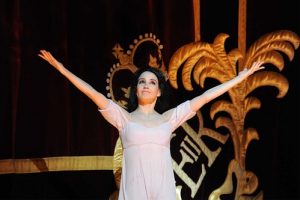
Récords de taquilla
Rojo fue nombrada directora artística del English National Ballet en 2012. Combina este papel con su carrera como bailarina, actuando como directora principal de la compañía. A los seis meses de unirse al English National Ballet, Rojo fue ascendida a directora y pasó a bailar todos los roles principales de la compañía. Sus actuaciones como Clara en El Cascanueces rompieron todos los récords de taquilla en el London Coliseum y el diario The Times la nombró «Dance Revelation of the Year».
Rojo se unió al Royal Ballet como directora por invitación de Sir Anthony Dowell poco después de su aclamado debut como artista invitada en Giselle, de Sir Peter Wright, y bailó allí durante 12 años. Desde entonces, Rojo ha sido reconocida en repetidas ocasiones por su excelencia artística.
Entre los premios que ha recibido incluyen: el Premio Laurence Olivier 2010 a la Mejor Nueva Producción de Danza; Los tres más altos honores de España, el Premio Príncipe de Asturias, la Medalla de Oro de Bellas Artes y la Encomienda de Número de Isabel la Católica. En 2016, Rojo recibió la insignia que la acredita como Comandante de la Orden del Imperio Británico por su contribución a la danza.

Un ciclo de homenaje a Blanco-White
El nombre del ciclo es un homenaje a José María Blanco-White, (Sevilla, 1775 – Liverpool, 1841); escritor, teólogo, periodista, crítico literario, sacerdote católico secularizado y uno de los tres grandes heterodoxos españoles conversos al protestantismo del siglo XIX, junto a Luis de Usoz y Río y Juan Calderón.
En el pasado, los ciclos rememoraron a los exiliados españoles en el Reino Unido, pero también se dialogó sobre viajeros británicos por la península o sobre episodios poco conocidos de la historia naval.
El sevillano Blanco-White se caracterizó por sus ideas progresistas, por su postura crítica ante la esclavitud y la desigualdad social y por su apoyo gradual a la independencia de las colonias de España en América. Más de un siglo después de su muerte, el escritor Juan Goytisolo, Premio Cervantes 2014, volvió a dar voz a Blanco White al escribir ampliamente sobre su vida y obra.
Tamara Rojo launches the new White-White Dialogues at Instituto Cervantes in London

The new series of White-White Dialogues will feature an exceptional guest, the dancer and English National Ballet director, Tamara Rojo, next Tuesday, October 29 at 7:00 pm, in a conversation with director of Instituto Cervantes in London, Ignacio Peyró.
The prestigious dancer will review her incredible artistic career and talk about the world of dance, her sacrifices and her successes, and the career of a Spanish woman who has triumphed in Britain, in an event that will be held in Spanish language.

The White-White Dialogues bring great characters related to Spanish culture as well as Anglo-Spanish relations between to the British public. In an informal and relaxed environment, Rojo, opens this new format with an in-depth conversation with the public as though they were her close confidants.
Peyró highlights the relevance of these dialogues to deepen the ties that unite both countries, in a cycle that in the coming months will also feature the presence of writer and 2016 Miguel de Cervantes Literature Prize, Eduardo Mendoza, chef Jose Pizarro and journalist, writer and businessman Juan Luis Cebrián, among others.
“Above all, we want to offer to our Spanish students, access to relevant personalities with great experience, which, in this environment of confidence, can bring them closer to culture and language,” says Peyró.

Box office records
Rojo was named artistic director of the English National Ballet in 2012. She combines this role with her career as a dancer, acting as the company’s principal director. Six months after joining the English National Ballet, Rojo was promoted to director and went on to dance all the main roles of the company. Her performances as Clara in The Nutcracker broke all box office records at the London Coliseum and The Times newspaper named her the «Dance Revelation of the Year.»
Rojo joined the Royal Ballet as director at the invitation of Sir Anthony Dowell shortly after her acclaimed debut as a guest artist in Giselle, by Sir Peter Wright, and danced there for 12 years. Since then, Rojo has been recognized repeatedly for her artistic excellence
The awards she has received include: the Laurence Olivier 2010 Award for Best New Dance Production; the three highest honors in Spain, the Prince of Asturias Award, the Gold Medal of Fine Arts and the Number Entrust of Isabel la Católica. In 2016, Rojo also received the badge that accredits her as Commander of the Order of the British Empire for her contribution to dance.

An homage to Blanco-White
The name of the cycle is a tribute to José María Blanco-White, (Sevilla, 1775 – Liverpool, 1841); writer, theologian, journalist, literary critic, secularised Catholic priest and one of the three great Spanish heterodox converts to nineteenth-century Protestantism, along with Luis de Usoz y Río and Juan Calderón.
In the past, the cycles reminded the Spanish exiles in the United Kingdom, but they also talked about British travelers on the peninsula or about little known episodes of naval history.
Sevillian Blanco-White was characterized by his progressive ideas, by his critical posture towards slavery and social inequality and by his gradual support for the independence of the colonies of Spain in America. More than a century after his death, the writer Juan Goytisolo, Cervantes Prize 2014, once again gave Blanco White a voice by writing extensively about his life and work.
«We film little, and in these times, it is also a declaration of principles»
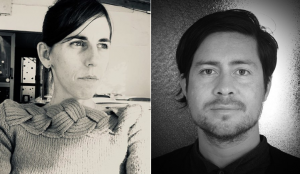
We interview filmmakers Teresa Arredondo and Carlos Vásquez Méndez after the premiere of their movie The Crosses at Open City Documentary Festival in London. Arredondo is a psychologist and filmmaker, her work in cinema revolves around the autobiographical. Her first work is a portrait of the last years of her grandmother, writer Matilde Ladrón de Guevara. Her first feature film, Sibila, received numerous awards at festivals around the world. She is a FIDOCS programmer and is co-founder of the Laguna Negra studio with Vásquez, with whom she develops different experimental and essay documentary film projects.
In the case of Vásquez, he is an artist and researcher. He uses cinema and photography from documentaries and an experimental perspective, establishing constant correspondences between artistic practice, social sciences, analog and digital. His works have been exhibited in various exhibitions and festivals. In 2016 his film [Pewen] Araucaria received the Joris Ivens / Center National des Artes Plastiques (France). With a bachelor of Cinema, a Master of Creation Documentary (IDEC / UPF) and a Master of Contemporary Artistic Creation (UB), he is currently developing his doctoral research.
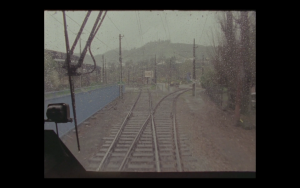
1. What does it mean for you to present Las Cruces in London?
It is our premiere in the UK, it is always interesting to hear the opinions of audiences other than Chilean and Latin American, who unfortunately share a dark part of our recent past and take the history of the film to our particular territories. That is why it is important to contrast the universality of this story about these heinous crimes, which although it arose in a particular context, speak of the banality of evil, about the economic sector as the factual power, about how the official history is written from the spheres of power.
2. What was the reception like in the United Kingdom?
In the Bertha DocHouse room all tickets were sold, we were surprised by the response of the London audience.
3. Las Cruces was recorded in 16mm, why this format?
We work in 16mm because we both learned cinema at film school – we understand cinema in this format and we are still trying to remain faithful to this material. More than a fascination for the plastic characteristics of the film image, we are interested in the methodology involved, the material is expensive, scarce and delicate, it forces us to prepare a lot every shot, rehearse, be very concentrated, film little. And in these times, it is also a declaration of principles: let’s say it is a conscious position as opposed to the banalization of images in the era of social networks.
4. Why did you decide to make this documentary?
This case has several peculiarities with respect to the totality of crimes of the dictatorship. The first is the participation of private in the crimes, the second is that there are confessions of the perpetrators, the third is the time that justice has been taken in issuing a sentence and this is a very symptomatic detail of the symbolic relevance of this case. Because it would be the first time that a company of a powerful family is imputed as a direct accomplice of crimes of disappearance and murder of Chilean citizens for their political ideas.
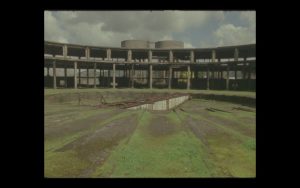
5. What was the response among the relatives of the 19 murdered?
They always agreed with the project, although we gave voice to the testimonies of the murderers instead of theirs. From the beginning they understood the central idea of the film and collaborated in every world without impositions or any conditions. They helped in the election of the inhabitants of the town who read the judicial documents, since the only condition we put to the relatives was that we did not want to expose them or submit them for reading in front of the camera. Our intention was to take care of them, work alongside them, not use their suffering.
6. What are you working on now?
The next thing is an exhibition in Port Bou at the end of September around the figure of Walter Benjamin and his tragic death. I have prepared a film piece – experimental medium-length film – about his trip through the Eastern Pyrenees before his life was taken away. With Teresa, the co-director of Las Cruces, we are working on three new projects together. The new pieces focus on the treaties on colonial history in Chile, from Spanish colonization to the planned colonization of citizens of northern Europe in the 19th century and the current post and neo-colonization of the most peripheral provinces. We have a studio called Laguna Negra, after Las Cruces, we really want to get a new movie together soon, hopefully we’ll have something next year.
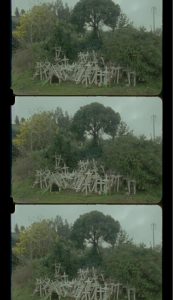
«Filmamos poco, y eso en estos tiempos es una declaración de principios»


London hosts the fourth edition of the Latin American classical music festival ECHOES Festival
The fourth edition of the ECHOES Latin American Classical Music Festival returns to London, taking place from October 10 to November 16 in some of the most prestigious venues for classical music in the capital, such as St Martin-in-the-Fields, the Royal Academy of Music and St James’s in Piccadilly.
The ECHOES festival is organized by the Spanish-British pianist and Latin American music expert Helen Glaisher-Hernández, and is co-produced by Instituto Cervantes in London and the Iberian & Latin American Music Society (ILAMS).
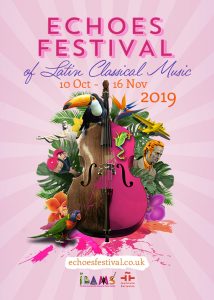
“We are proud to be able to offer a platform for some of the most authentic and illustrious voices of current Latin American classical music, some of them rarely or never heard before in the United Kingdom,” explains the artistic director of the ECHOES Festival, Helen Glaisher-Hernández.
“At Instituto Cervantes in London, we have been supporting and co-producing the ECHOES festival since its inception for several reasons: the quality of the performers and the auditoriums, the variety and originality of the repertoire and the seriousness of the ensemble. It is the most useful and beautiful way to bring the best of Latin American classical music to the public in London, ”explains the director of Instituto Cervantes in London, Ignacio Peyró.
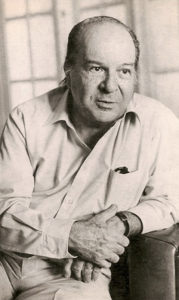
In its fourth edition, the ECHOES Festival commemorates the 400th anniversary of the birth of Mexican composer Juan García de Zéspedes (1619 – 1678), with a concert by the Lacock Scholars. It also highlights the centenary of the birth of the Brazilian composer Cláudio Santoro (1919 – 1989) with a recital and lecture by the composer’s son, Alessandro Santoro, as well as the centenarians of the Cuban composer María Álvarez Ríos and the Brazilian Hilda Pires dos Reis.

- Promotion of young talent
The ECHOES Festival is associated with King’s College University in London for the first time, to offer a new educational platform to young talent, with free master classes on October 19th. ECHOES Festival also continues the collaboration with the Royal Academy of Music to promote contemporary music and live composers on November 1st.
In addition, Ray Picot will present a new music appreciation event on October 24 entitled Ray’s Round-Up LIVE!, focusing on the music of Enrique Granados. And ECHOES Festival is also part of the Friend Month, a five-week period of events that celebrate the history, culture and contribution of the three million Spanish and Portuguese speakers in the United Kingdom.

- Language and music to learn Spanish
This year there are more ways than ever to participate in the ECHOES Festival: even babies and toddlers can enjoy a Spanish music class called Bilingual Beats on October 29th.
While amateur singers can participate in the Mexican baroque workshop, Come & Sing on November 16th. Singers who are fond of classical music, and have some previous experience of choral interpretation, can participate in this stimulating workshop in the church of St Botolph-without-Bishopsgate.
- Music and wellness
On November 14th, GéNIA, founder of the innovative Piano-Yoga method, invites you to participate in an experience that unites mind, body and spirit. As a fresh and unique response to the current ‘yoga class with live music’ fashion, the session will combine specific yoga exercises with musical performances.
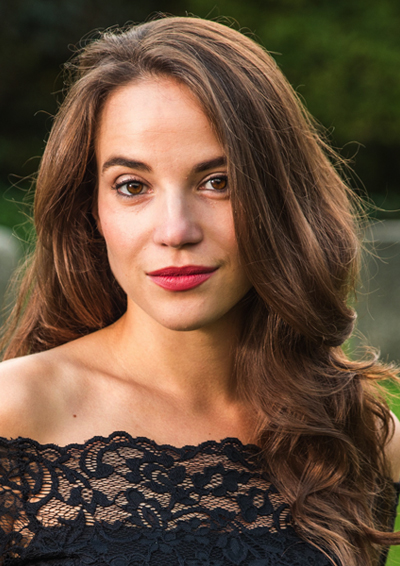
- Forgotten voices
As part of a new series of events, on November 15th, there will be a sample of the forgotten voices of the Latin composers: Women: present! The public will discover the voices of female poets and musicians that span three centuries from all corners of the Latin world, including Spain, Cuba, Venezuela, Argentina, Brazil and Mexico. The event is presented by two preeminent artists specialized in this repertoire: the soprano Lorena Paz Nieto and pianist Helen Glaisher-Hernández.
Londres acoge la cuarta edición del festival de música clásica iberoamericana ECHOES FESTIVAL
Vuelve a Londres la cuarta edición del Festival de Música Clásica Iberoamericana ECHOES, que tendrá lugar del 10 octubre al 16 de noviembre en algunos de los lugares más prestigiosos para la música clásica de la capital, como St Martin-in-the-Fields, la Royal Academy of Music y St James’s Piccadilly.
El festival ECHOES está organizado por la pianista hispano-británica y experta en música iberoamericana Helen Glaisher-Hernández, y está coproducido por el Instituto Cervantes de Londres y la Iberian & Latin American Music Society (ILAMS, por sus siglas en inglés).

“Nos enorgullece poder ofrecer una plataforma para algunas de las voces más auténticas e ilustres de la música clásica iberoamericana actual, algunas de ellas rara vez o nunca antes escuchadas en el Reino Unido”, explica la directora artística del Festival ECHOES, Helen Glaisher-Hernández.
“En el Instituto Cervantes de Londres llevamos desde su comienzo apoyando y coproduciendo el festival ECHOES por varios motivos: la calidad de los intérpretes y los auditorios, la variedad y originalidad del repertorio y la seriedad del conjunto. Es la manera más útil y hermosa de acercar al público de Londres lo mejor de la música clásica iberoamericana”, explica el director del Instituto Cervantes en Londres, Ignacio Peyró.

En esta cuarta edición, el festival ECHOES conmemora el 400 aniversario del nacimiento del compositor mexicano Juan García de Zéspedes (1619 – 1678), con un concierto de los Lacock Scholars. También destaca el centenario del natalicio del compositor brasileño Cláudio Santoro (1919 – 1989) con un recital y conferencia a cargo del hijo del compositor, Alessandro Santoro, así como los centenarios de la compositora cubana María Álvarez Ríos y la brasileña Hilda Pires dos Reis.

- Promoción del talento joven
El festival ECHOES se asocia en esta nueva edición por primera vez con la universidad de King’s College en Londres para ofrecer una nueva plataforma educativa a los talentos jóvenes, con clases magistrales abiertas gratuitas el 19 de octubre. ECHOES continúa además la colaboración con la Royal Academy of Music para promover la música contemporánea y los compositores vivos el 1 de noviembre.
Además, Ray Picot presentará un nuevo evento de apreciación musical el 24 de octubre titulado Ray’s Round-Up LIVE!, centrándose en la música de Enrique Granados. Y ECHOES también forma parte del Mes Amigo, un período de cinco semanas de eventos que celebran la historia, la cultura y la contribución de los tres millones de hispanohablantes y portugueses que hay en el Reino Unido.

- Lengua y música para aprender español
Este año hay más formas que nunca de participar en el Festival Echoes: los bebés y los niños pequeños pueden disfrutar de una clase musical en español llamada Bilingual Beats el 29 de octubre.
Mientras que los cantantes aficionados pueden participar en el taller de barroco mexicano Come & Sing el 16 de noviembre. Los cantantes aficionados por la música clásica con alguna experiencia previa de interpretación coral, podrán participar en este estimulante taller en la iglesia de St Botolph-without-Bishopsgate.
- Música y bienestar
El 14 de noviembre, GéNIA, fundadora del innovador método Piano-Yoga, invita a participar en una experiencia que une mente, cuerpo y espíritu. Como una respuesta fresca y única a la moda actual de ‘clase de yoga con música en vivo’, la sesión combinará ejercicios de yoga específicos con actuaciones musicales.

- Voces olvidadas
Como parte de una nueva serie de eventos, el 15 de noviembre habrá una muestra de las voces olvidadas de las compositoras latinas: ¡Mujeres: presentes! El público descubrirá las voces de mujeres poetas y músicas que abarcan tres siglos de todos los rincones del mundo latino, incluidos España, Cuba, Venezuela, Argentina, Brasil y México, presentados por dos preeminentes artistas especializadas en este repertorio: la soprano Lorena Paz Nieto y la pianista Helen Glaisher-Hernández.
FesTeLõn, the festival of Spanish theatre in London
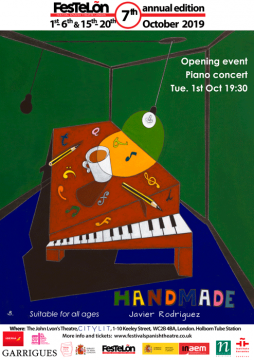
FesTeLõn, the festival that celebrates Spanish theatre in London is back for the 7th annual edition with a series of contemporary and Spanish Golden Age plays, lectures and workshops. For two weeks in October, from the 1st to 6th and 15th to 20th, the John Lyon Theatre will host a diversity of productions to submerge the audience in some of the most exciting modern and classic Spanish theatre. The premier night of each production will be followed by a Q&A session with the audience aimed at strengthening the cultural interchange and understanding between spectator and performer.
This year FesTeLõn launches its very own fringe festival, FesTeLõn-OFF. Emerging companies in the UK are invited to perform a Spanish play in a competition to be held in London next April. The winner will then perform at FesTeLõn 2020.
For the founder of the festival, Mariví Rodríguez Quiñones, the highlight of this year’s edition lies in ‘the powerful productions that give voice to women and the LGBT community to talk about power, love, violence, homophobia, struggles as relevant in their day as they are now’.
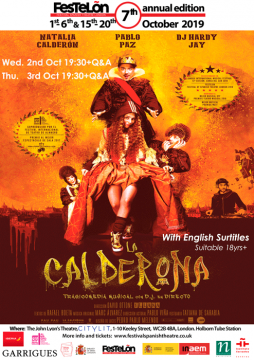
Starting with ‘La Calderona’, a black comedy musical that uses hip-hop, with a live DJ on stage, that tells the story of the most controversial of king Philip IV’s lovers. The play speaks of power, ambition, love and survival, relevant concepts in 17th century Spain that resonate very strongly with contemporary audiences.
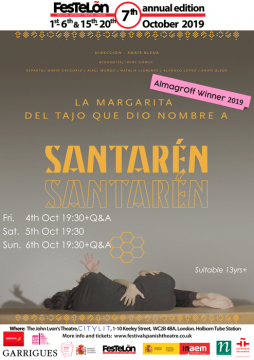
The 2019 winning production of AlmagrOff, the fringe festival that runs alongside the prestigious International Festival of Classical Theatre in Almagro, will have its UK premier at FesTeLõn. ‘La Margarita del Tajo que dio nombre a Santarén’ is a riotous and tragicomic adaptation of a religious comedy about passion, adultery, sacrilege and femicide.
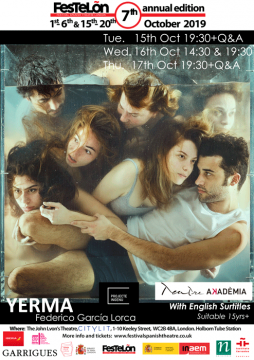
Lorca’s acclaimed play Yerma will open the second week of the festival. The portrayal of a woman’s desperate desire to become a mother reflects on the tragedy of unfulfilled expectations and the meaning of fertility in the modern day.
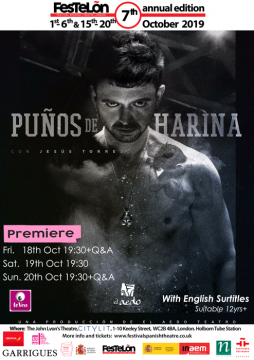
With only one actor on stage, Powdered Fists (Puños de Harina) presents two parallel stories of two gypsy boxers living at different moments in time but sharing similar experiences of violence, masculinity, racism and homophobia.

And last but not least, ‘Crickets and Fireflies’ (Grillos y Luciérnagas), a production about the lights and sounds of the night will instil the theatre bug in the younger audiences.
